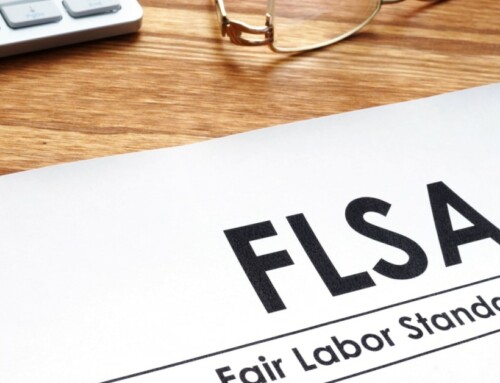The federal Pregnant Workers Fairness Act (PWFA) took effect on June 27, 2023. Under this new law, covered employers must provide reasonable accommodations to qualifying workers who need them due to pregnancy, childbirth, or a related medical condition. This obligation does not apply if providing a reasonable accommodation would cause significant difficulty or expense (which is referred to as “undue hardship” in the statute).
The PWFA expands upon the protections that are already afforded to pregnant workers (and previously pregnant workers) under other federal laws—including Title VII, the Americans with Disabilities Act (ADA), the Family and Medical Leave Act (FMLA), and the PUMP Act. The U.S. Equal Employment Opportunity Commission (EEOC) is tasked with administering and enforcing the PWFA; and, to this end, it has recently adopted an extensive set of regulations that further define employers’ obligations under the law.
The EEOC’s Pregnant Workers Fairness Act Regulations: An Overview
The EEOC issued proposed regulations under the Pregnant Workers Fairness Act on August 11, and the comment period closed on October 10. In the introduction to the regulations, the EEOC notes that “there are gaps in the Federal legal protections for workers affected by pregnancy, childbirth, or related medical conditions, even though they may have certain rights” under the statutes listed above. Congress enacted the PWFA to close these gaps; and, recognizing this legislative purpose, the EEOC has taken an expansive approach to interpreting the new law’s requirements for employers.
Here are some key aspects of the EEOC’s Pregnant Workers Fairness Act regulations for employers in North Carolina and South Carolina:
Definition of “Pregnancy, Childbirth, or Related Medical Conditions”
Under the PWFA, covered employers must provide reasonable accommodations to qualifying employees who are affected by “pregnancy, childbirth, or related medical conditions.” The EEOC’s regulations define these terms broadly to include all of the following:
- Current, past, or potential pregnancy
- Endometriosis
- Having or choosing not to have an abortion
- Infertility and fertility treatments
- Lactation (including breastfeeding and pumping)
- Menstruation
- Miscarriage and stillbirth
- Use of birth control
Importantly, the EEOC’s regulations also make clear that “the list in the regulation[s] is non-exhaustive.” Thus, workers may request (and employers may be required to provide) reasonable accommodations for other pregnancy-related conditions as well. As the EEOC further clarifies, “to receive an accommodation an employee or applicant does not have to specify a condition on this list or use medical terms to describe a condition.”
The EEOC’s regulations also clarify that qualifying workers may be entitled to reasonable accommodations for medical conditions that are not necessarily related to pregnancy, but that are related to pregnancy in their circumstances. It provides high blood pressure, Type 2 diabetes, and anxiety as a few examples. To illustrate, the EEOC explains that if a worker who is taking unpaid leave to obtain treatment for anxiety experiences worsened anxiety due to pregnancy or childbirth, the worker’s anxiety would become covered under the PWFA.
Examples of Reasonable Accommodations Under the PWFA
The EEOC’s regulations also provide a non-exclusive list of examples of reasonable accommodations under the PWFA. As the EEOC notes, “an employee or applicant may need more than one of these accommodations [or others] at the same time or as a pregnancy progresses.” The examples provided in the regulations are:
- Frequent breaks
- Sitting or standing (i.e., a sit/stand desk or anti-fatigue floor mat)
- Schedule changes, part-time work, and paid or unpaid leave
- Telework or “work from home”
- Reserved parking
- Light duty work
- Making existing facilities accessible or modifying the work environment
- Job restructuring
- Temporarily suspending one or more of the worker’s essential functions
- Acquiring or modifying equipment, uniforms, or devices
- Adjusting or modifying examinations or policies
As is the case under the ADA and other pertinent statutes, an employer does not necessarily need to provide the specific reasonable accommodation that a worker (or the worker’s representative) requests. However, if providing one particular reasonable accommodation would cause undue hardship while providing another would not, then the employer must generally provide a suitable alternative.
Evidence of Disability or Severity is Not Required
Clarifying that the PWFA is not duplicative of the ADA, the EEOC states that, “the physical or mental condition leading the worker to seek an accommodation can be a modest, minor, and/or episodic problem or impediment.” As a result, a worker’s condition does not need to qualify as a disability to warrant a reasonable accommodation. The EEOC’s regulations also make clear that “there is no threshold of severity required under the PWFA.”
Thus, while workers who request a reasonable accommodation under the PWFA must have a valid medical condition, employers may not consider the severity of a worker’s condition in deciding whether a reasonable accommodation is required. If a qualifying worker is affected by pregnancy, childbirth, or a related medical condition and requests a reasonable accommodation, then the employer must provide one unless the statute’s undue hardship exception applies.
How Covered Employers Can (and Should) Address Their New Obligations Under the PWFA
There are many more aspects to the EEOC’s regulations under the PWFA, and covered employers must ensure that they comprehensively address their new obligations to mitigate their risk effectively. To comply with the PWFA and the EEOC’s regulations, covered employers should work with their employment law counsel to update their policies and procedures and provide training to all relevant personnel. Due to the breadth of the PWFA and the EEOC’s regulations, existing Title VII, ADA, FMLA, and PUMP Act policies and procedures are not sufficient. Covered employers must address the PWFA and the EEOC’s regulations specifically, and they must do so in a manner that facilitates compliance on an ongoing basis.
Schedule an Appointment with an Employment Lawyer at Gignilliat, Savitz & Bettis, LLP
The employment lawyers at Gignilliat, Savitz & Bettis, LLP represent employers of all sizes throughout North Carolina and South Carolina. If you need to know more about your company’s obligations under the Pregnant Workers Fairness Act, please call 803-799-9311 or contact us online to arrange a confidential consultation.






